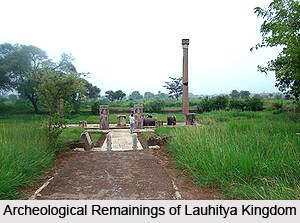 Lauhitya kingdom is an ancient kingdom belonging to `Dwapara Yuga` or `Treta Yuga`, located in the easternmost portion of India, on the banks of Brahmaputra River. As per Hindu mythology, this old kingdom had been visited by Bhargava Rama and also by Bhima, a Pandava for the purpose of collecting tribute for `Rajasuya Sacrifice` of Yudhisthira, during a military campaign. Presently, there exists a region named Lohit in the eastern Indian state of Arunachal Pradesh, which is believed to be the ruins of Lauhitya kingdom. Historical sources also refer to a certain Naga ruler named `Lohita` who reigned over an area near Kashmira. The Hindu epic of Mahabharata has mentioned about the existence of some other Naga kings apart from Lohita who ruled the territory close to Kashmira. They included Airavata, Vasuki, Takshaka and others. It is also asserted in Mahabharata that Arjuna had paid a visit to Lauhitya to accumulate revenue for the Rajasuya sacrifice conducted by Yudhisthira. Arjuna had captured this region after defeating Kashmira`s Kshatriyas as well as King Lohita.
Lauhitya kingdom is an ancient kingdom belonging to `Dwapara Yuga` or `Treta Yuga`, located in the easternmost portion of India, on the banks of Brahmaputra River. As per Hindu mythology, this old kingdom had been visited by Bhargava Rama and also by Bhima, a Pandava for the purpose of collecting tribute for `Rajasuya Sacrifice` of Yudhisthira, during a military campaign. Presently, there exists a region named Lohit in the eastern Indian state of Arunachal Pradesh, which is believed to be the ruins of Lauhitya kingdom. Historical sources also refer to a certain Naga ruler named `Lohita` who reigned over an area near Kashmira. The Hindu epic of Mahabharata has mentioned about the existence of some other Naga kings apart from Lohita who ruled the territory close to Kashmira. They included Airavata, Vasuki, Takshaka and others. It is also asserted in Mahabharata that Arjuna had paid a visit to Lauhitya to accumulate revenue for the Rajasuya sacrifice conducted by Yudhisthira. Arjuna had captured this region after defeating Kashmira`s Kshatriyas as well as King Lohita.
Mythological accounts are of the view that when Bhima had arrived at Lauhitya to collect tribute, he had won battles against King Mahaujah, ruler of Kausika-Kachchha, Paundraka-Vasudeva, ruler of Pundras and finally attacked King Chandrasena, King Samudrasena, King of Vanga, King of Suhmas, ruler of Karvatas and all Mlechchha tribes. Following these conquests, he then progressed towards Lohity. Bhima had compelled the Mlechchha tribals to pay taxes and several other forms of wealth. Different tribes of Kiratas reside on both the sides of Lohitya Mountains, which are present on the borders of Arunachal Pradesh and Assam.
Lohitya River is actually another name of the Brahmaputra River, which flows across Assam and Arunachal Pradesh. A sacred region referred to as `Urvasi`, named after Apsara Urvasi is also present near the Lohitya River. Bhargava Rama is believed to have built a pilgrimage spot at Lauhitya kingdom.
This article is a stub. You can enrich by adding more information to it. Send your Write Up to content@indianetzone.com









